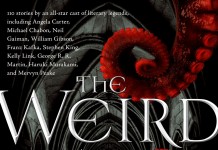 Damien Walter, writing in The Guardian, has resurrected Rudy Rucker’s 1983 essay “The Transrealist Manifesto” to tag transrealism as “the first major literary movement of the 21st century?” As the question mark suggests, though, here’s only one problem: Is it so?
Damien Walter, writing in The Guardian, has resurrected Rudy Rucker’s 1983 essay “The Transrealist Manifesto” to tag transrealism as “the first major literary movement of the 21st century?” As the question mark suggests, though, here’s only one problem: Is it so?
Rudy Rucker’s original essay defines transrealism as “not so much a type of SF as it is a type of avant-garde literature,” and, incidentally, “the only valid approach to literature at this point in history.” According to Rucker, “the Transrealist writes about immediate perceptions in a fantastic way,” because “the genre of straight realism is all burnt out. Who needs more straight novels? The tools of fantasy and SF offer a means to thicken and intensify realistic fiction.” I wouldn’t necessarily argue with that, except that Rucker’s statement was two things: a personal manifesto, and one from very much a science fiction writer. And also, for transrealism to be an actual movement, wouldn’t other authors have to self-consciously get in line behind his statements as self-declared transrealists?
I am simply not persuaded that the authors Walter mentioned ever took Rucker’s precepts to heart for Rucker’s reasons. Philip K. Dick, for instance, was writing way before Rucker articulated the tenets of transrealism, and was certainly a self-aware enough writer to know what he was doing and why. Ditto Thomas Pynchon and JG Ballard. “Popular fantasy or science fiction stories like Harry Potter or The Hunger Games lack a strong enough reality to be discussed as transrealism,” declares Walter, but Harry Potter is clearly more popular, and The Hunger Games arguably more resonant, with contemporary readers than any transrealist title mentioned in Walter’s article.
There is also the small problem of what Rucker said transrealism does. “The familiar tools of SF — time travel, antigravity, alternate worlds, telepathy, etc. — are in fact symbolic of archetypal modes of perception,” he stated. “Time travel is memory, flight is enlightenment, alternate worlds symbolize the great variety of individual world-views, and telepathy stands for the ability to communicate fully.” Maybe so – but there are very may ways, including Harry Potter-style fantasy, to access those archetypal modes of perception. Rucker doesn’t give a reason to start from science fiction to get to them. Yes, he did have a personal problem with traditional hard sci-fi, like many of his generation. “There will always be a place for the escape-literature of genre SF. But there is no reason to let this severely limited and reactionary mode condition all our writing. Transrealism is the path to a truly artistic SF.” However, that’s a pretty narrow goal compared to what Walter sets up for transrealism.
Rucker at least doesn’t rule out other genres. Why not dark fiction or cosmic horror as a way to access those old archetypes? Why not historical fiction, even, or romance? But then, Walter is the one resurrecting his manifesto and trying to universalize it. “It’s in the next 30 years that it may well define literature as we come to know it,” Walter concludes – but personally, I won’t be waiting.

































